- Home
- Stephen Hunt
The Rise of the Iron Moon Page 2
The Rise of the Iron Moon Read online
Page 2
The hunters’ lethal-force weapon would be recharging. Kyorin only had seconds left.
‘No you don’t, my old son.’ The policeman’s pistol swung towards Kyorin and he pointed to a pair of iron manacles he had laid next to the lamp. ‘You slip those on, nice and easy, like.’
‘Run, you fool,’ Kyorin pleaded to the policeman. ‘You can’t—’
‘Hey!’ The Middlesteel constable had finally noticed that Kyorin was speaking without his lips moving. ‘How—?’
The bolt of fire leapt out from the other end of the docks, striking the crusher on his chest. The black patent leather belt that crossed his tunic shredded as the uniform became a conflagration, the silver belt buckle bearing the arms of the Middlesteel police flying past Kyorin’s face, tiny drops of molten metal splattering his brown hair.
Kyorin caught the burning police officer’s body as he fell back, just enough life left in him to help Kyorin escape – to serve and protect, as the crusher’s oath demanded. Resting his hand above the policeman’s fluttering eyes, ignoring the smell of burning flesh – so repellent to a plant-eater – Kyorin made the connection to the crusher’s forehead with his hand. Swim. How to Swim? I must know! Kyorin was flooded by images – visions that seemed to last hours rather than the solitary second that was passing: the chemical reek of the public baths along Brocroft Street, a stream in a small flint-walled village in Lightshire, fishing rods laid down in the grass while the policeman and his friends launched themselves into the water. The images grew angular and sharp, the constable’s brain shutting down as the fatal burns worked their way through the beautiful system of cooperating organs that was his body.
Letting the dead policeman drop, Kyorin sprinted towards the river and launched himself into its cold, enveloping cover as the howls of his pursuers echoed around the docks. Holding his breath, Kyorin kicked under the surface, using his newfound swimming skills, allowing the current to sweep him away as the water boiled where the hunters’ recharged weapon furiously steamed the river’s surface. But the waters were deep and wide and the sky too dark for the hunters’ killing lances of fire to find his heart this night. With the weapon drained, a hail of darts broke the surface, spiralling past Kyorin like stones dropped in the water. Their final act of desperation became a brief flash of elation for Kyorin. He had escaped! As he swam, his hand checked the carefully wrapped bulge in his pocket where the book was, brought from the stationer’s cart on Burberry Corner with a coin so realistic the shopkeeper would never realize it had been perfectly counterfeited for the expeditionary party. Back home, that book would have been a death sentence. But here in Middlesteel, well, here it might just be a chance for life.
Kyorin let the currents carry him after the corpse of his compatriot, the poor dead desert nomad, leaving hungry mouths behind on the docks; mouths that would now be considering how best to evade the call of compressed air whistles converging on their position on the docks.
The river took everything, in Middlesteel.
Warder Twelve looked at the new boy, hiding his deep reservations about the quality and judgement of the lad. Why, wondered Warder Twelve, when analysts in the great transaction-engine chambers did not live up to their potential, did the Court of the Air’s ruling council always judge that their next career move should be across to the spheres of the aerial city where the Court held its prisoners? Surely the dangerous breed that the Court of the Air removed from circulation in the Kingdom of Jackals warranted more respect than the bored attitude of this new greenhorn. A greenhorn who judged – quite rightly – that duty minding the cells was something of a demotion from modelling the plays and flows of their civilization in the great transaction-engine chambers.
‘So, these colours,’ said the boy, tapping the card slotted above the armoured cell door. ‘They indicate the potential of the prisoner to make trouble?’
‘Aye,’ said the warden, ‘and the care you need to take when interacting with the prisoner. The likelihood they might escape.’
‘Escape?’ The lad laughed. ‘There has never been an escape from the Court of the Air. Not once in five hundred years.’
Warder Twelve winced. This young buck didn’t see all the work that went into keeping things that way: the effort, the foiled escapes – many of them just mind games to keep hope alive in the prisoners, to keep their wickedness and ingenuity flowing in streams the Court could control and curtail. It was the curse of being a warder. Nobody noticed when you did your job well; nobody thanked you for decades of trouble-free internment. But let just one rascal escape, why then the rest of the aerial city would be complaining for months about how many staff it took to man the cells, how they did nothing but sit around and play cards out on the prison spheres.
‘This is a green-ten,’ said the warder, laying a hand on the cell door. ‘Green is the lowest level of threat and ten is the lowest level of prisoner intelligence.’
‘Ah,’ said the lad. ‘A politician, then.’
The warder opened a small slot in the door, a slit of one-way glass revealing a man in a faded waistcoat sitting by a desk before a sheaf of papers, reaching over to dip his metal stylus in a pot of ink. Writing memoirs that nobody would ever read – well, nobody except the Court’s alienists, as the surgeons of the mind perfected their understanding of the criminal soul.
‘Crimes against democracy. This flash fellow used to represent a district down in Middlesteel, until he started using his street gangs to intimidate voters on election day. We disappeared him after he made contact with the flash mob to arrange to have two of his opponents poisoned.’
‘He hardly seems worth the effort,’ said the boy.
‘You think so?’ The warder shook his head. Underestimating an opponent. Shocking. Hadn’t his tutors knocked any sense into him when he had first been apprenticed into the Court of the Air’s service?
The lad fingered the red lever to the left of the door, a wax seal protecting the metal switch, proving it was unbroken and had never been used. ‘Decompression throw for the cell?’
‘Yes.’ Warder Twelve pointed to a bigger lever at the end of the corridor. ‘That one up there will flush the whole level, in case there’s a mass breakout attempt. Back in the control room we can blow the entire aerosphere and disconnect all corridors into the rest of the city if it cuts up really rough across here.’
‘Have you ever had to blow a cell?’
‘On my watch?’ said the warder. ‘Once, seven years back. The science pirate Krook. He had decrypted the transaction-engine lock on his cell and was working on the last of his door bolts. He was a master of mesmerism and had hypnotized the warder walking his level. We killed Krook from upstairs. He left us no choice in the matter.’
The lad nodded. Explosive decompression, a couple of seconds choking in the slipstream of the troposphere, then unconsciousness long before the impact of a mile-high fall from the dizzying height of the Court’s levitating city removed his mischief from the face of the world. A fitting fate for an enemy of the state.
The lad looked up at the card above the next armoured door. It was purple, with the numeral one stencilled across it. ‘That’s the first time I’ve seen that colour over here.’
‘A P1. So, you’ve a taste for the strong stuff?’ noted the warder. ‘Do you really want to see who’s inside this cell?’
‘I—’ he hesitated. ‘I think so.’
Warder Twelve laid his hand on the viewing slit. ‘Then gaze upon Timlar Preston!’
Timlar Preston? But this was just a man, not an ogre. Old and thin, in a cell wallpapered by white sheets, every inch thickly pencilled with formulae and diagrams. He was standing pushed up against a wall – so close you’d think he was trying to draw warmth from the riveted metal, his pencil scratching in ever smaller circles, the writing increasingly tiny now there was hardly any space on the papers left. He turned around to gaze at the viewing slit, a flash of wild eyes and wispy silver hair, then returned to his scribbling.
&nb
sp; ‘He can see us?’ asked the lad. ‘I was told that the door’s cursewalls allowed one-way viewing only?’
‘He always knows when we’re watching him,’ said Warder Twelve. ‘Don’t ask me how. There’s a touch of the fey about him, if you ask me.’
The greenhorn gazed into the cell again. Timlar Preston didn’t seem like much, certainly not the man who had nearly destroyed the Kingdom of Jackals during the Two-Year War, the Great War, the foreigner whose weapons had propelled the hell of conflict deep into the Jackelian counties. He was from Quatérshift, that much you could see, a dirty shiftie, no honest, round jowls of the Jackelian yeoman for this one; no honest fat from a diet of roast beef, beer and jinn. Thin, wiry, with a proud nose that lent him an hauteur distinctly lacking in his mad scratchings.
‘You still think you have what it takes to keep such as he away from our shores?’ asked Warder Twelve.
The lad held his tongue. Inside the cell, Timlar Preston was turning in a circle, waving his pencil. Conducting an imaginary symphony of madness.
‘You want to keep him dancing for us, rather than inventing bloody great devices of war for the shifties to use against your fellow Jackelians? Men like him aren’t controlled by this—’ the warden slapped the transaction-engine drum turning on the armoured lock. ‘They are controlled up here!’ He tapped his skull. ‘Walking the cells with a toxin club swinging from your hand won’t be your vocation in the prison spheres, any more than tapping the ivories on your key-writer was your job when you worked over in analysis. Getting into the minds of people like Timlar Preston, that’s the task for you and me. We drug his food once a week; change his pencil for one slightly fatter, slightly longer, a different shade. To keep him off balance, you see? Then we take his sketches, the ones we can understand, and change some of the formulae. Forgery section uses his handwriting to do it for us. Just enough to keep him wondering if it was he who wrote the maths or one of us. Just enough to keep him wondering if he’s going mad. And while he’s doing that, he’s not trying to break the hex we’ve got laid around his cell. He’s not thinking of creating weapons that could lay waste to our country.’
Timlar Preston’s mad dance in the centre of the cell had ended, the genius arriving at the other side of the viewing slit in three long, low strides. His shriek was relayed by the voicebox next to the cell door, the piece of paper he had been writing pushed up against the viewing slit, full of spirals, a procession of seashell-like geometries drafted with insane precision. ‘They’re coming! They’re coming!’
The lad looked at Warder Twelve. ‘What is he talking about?’
‘Something new,’ said Warder Twelve. ‘He’s been ranting about it for days. He’s due for the old sleepy soup and a few mind games at the end of this week. When we search his cell, we’ll probably find the notes on whatever his latest obsession is.’
‘I can hear him!’ Preston yelled. ‘Talking to me. Telling me what to do. What we need to do to survive.’
Warden Twelve flicked the sound off the voicebox and closed the viewing slit. ‘Back to the lifting room; the next level down is where we keep the prisoners with special powers– all the fey ones, the sorcerers and witches. You’re going to love them.’
They walked away, oblivious to the muffled banging on the other side of the cell door. Timlar Preston howling and throwing his papers around the cell.
Commodore Black looked over at his friend Coppertracks. It would take someone very used to steammen ways to tell that the scientist was nervous. But then, the commodore had lived with the steamman under the roof of Tock House for long enough that he could read the patterns of energy that danced under his iron friend’s transparent crystal skull like other men could read furrows in a brow or the nervous drum of fingers on a desk. And it took a lot to make one of the metal creatures nervous.
The patter of polite applause from the direction of the stage indicated that the previous presentation in front of the massed ranks of the Royal Society was going well. Well for the presenter, but not so well for Coppertracks’ chances of extracting the full financial and intellectual backing of the society if they squandered their time and resources on too many of his rivals’ proposed projects. It was a competitive business, this society of ideas, mused the commodore – as if the Kingdom of Jackals only had so much deck space for what its people thought about, and the pondering of one belief – one truth – left less room for any others to thrive.
‘You are sure you have all of my slides in the correct order?’ asked Coppertracks.
‘You know that I do,’ said the commodore. ‘Haven’t I practised enough on your blessed magic lantern back at the house? You keep your attention on the audience, I shall give your scientist friends a visual display of your genius that would put to shame the lantern operators of the theatres along Lump Street.’
‘There is really no need for you to assist me, dear mammal,’ said Coppertracks. ‘I could have brought one of my mu-bodies to operate the projection apparatus.’
Commodore Black nodded, but didn’t point out that having one of the steamman’s metal drones capering about the stage would only serve to remind the mainly warm-blooded races sitting in the auditorium that Coppertracks was a slipthinker – his genius so large he had to distribute his consciousness among multiple iron bodies. Back home in the Steammen Free State, they treated Coppertracks as royalty. Here in the Kingdom of Jackals, he was just a metal clever clogs who constantly reminded the members of the Royal Society how dim most of them were in comparison.
‘Now,’ said Coppertracks, rubbing nervously at his metal hull, polishing it to a high, gleaming sheen, ‘where is Molly softbody? She must have picked up that slide I changed by now.’
‘I have,’ said a voice behind them. It was Molly Templar, the third member of the trio that shared the comforts inside Tock House’s walls. Molly was sweating slightly under her long red hair – she had obviously been straining to get to the presentation in time. ‘It turned out the chemist finishing off your last slide was one of the more persistent devotees of my writing. He wouldn’t hand over the damn thing until I had signed at least two of my novels for him.’ She produced a little glass square, chemically etched with one of the steamman’s images.
Molly peered round the curtain to see how well the current presenter’s talk was going, then ducked back and lifted a copy of the Middlesteel Illustrated News out of her coat pocket, passing it to Coppertracks. ‘Read the cover story. It’s a pity your presentation isn’t proposing a superior design for airship engines. The merchant marine has grounded all its flights – apparently dust from the wake of Ashby’s Comet has fouled the fleet’s motors. While they’re being checked and cleaned out on the airship fields, the cost of narrowboat berths and stagecoach tickets is rising in every county.’
Coppertracks showed the commodore the newspaper’s cover illustration, a swarthy canal boat owner with a long queue of Jackelian citizenry alongside his narrowboat and his oversized cupped hands full of coins. The speech bubble read: ‘A ride, good damsons and sirs? I think I may yet take you for a ride.’
‘Lucky then, that the three of us have no mortal plans for travelling beyond the capital,’ said the commodore. ‘Let them jack their prices up to a guinea a ticket. We can warm ourselves by the fire in Tock House and wait for winter to come while Coppertracks tinkers with his science, you pen your novels, and I take my well-earned rest from the trials and tribulations fate has sent nipping at my heels.’
One of the society administrators slipped behind the crimson curtain. ‘Aliquot Coppertracks, you are on, sir. If you don’t mind keeping your presentation to ten minutes, with five for questions, we are running a little behind at the moment.’
‘Ten minutes, lad?’ interjected the commodore. ‘If we can’t make the members of your fine society see the bright fury of Coppertracks’ brilliance in half that time, then they haven’t half the wits they were born with.’
The administrator moved aside so that the commodore and Mo
lly could pass by to the table where their magic lantern was burning oil in front of an array of mirrors. Coppertracks rolled carefully to the lectern, staring out at the sea of faces – sombre stovepipe hats and conservative dress the order of the day among the race of man. A few thinkers of the Kingdom of Jackals’ other races were present too: steammen, graspers, a handful of lashlites – lizard-winged sages whose adherence to their aural teachings had driven them to seek wider learning when the sagas of their gods had been mastered and exhausted.
Coppertracks motioned to the commodore to project the first slide onto the white screen behind him, when a buzz of excitement arose from the audience, interrupting the start of the steamman’s presentation. Molly nudged the commodore.
Commodore Black looked around to see the source of the commotion and groaned. It was him. Making a fashionably flamboyant late entrance – no doubt perfectly timed to put Coppertracks off. Behind the lectern, the energy swirl under Coppertracks’ crystal skull had turned spiky. The steamman equivalent of a back arching as he recognized the face of his rowdy adversary. For every academic paper Coppertracks published, Lord Rooksby could be sure to make it into the journals with a contrary view. While Coppertracks shared his metal race’s methodical, steady brilliance – progress cautiously but steadily advanced over a lifetime of many centuries – Lord Rooksby was the exemplar of the race of man’s short-burn approach to science. Erratic leaps of faith and intuitive gambling that sometimes paid off, but often floundered with a heavy landing. Of course Lord Rooksby would be here at the Royal Society meeting. He couldn’t resist the opportunity for a little mischief at the expense of his steamman rival. Rooksby believed that Jackals did best when it was the hand of mankind that ruled it, and that the place of steammen, graspers, craynarbians, lashlites and the other creatures of the nation was walking two steps well behind his race’s polished calf-leather boots.
‘Don’t mind me,’ said Lord Rooksby, sweeping back his velvet-lined cloak with a flourish. The two women he had brought along sat down on either side of him and looked up adoringly at the slim, elfin-chested scientist, as if his every aristocratic word contained a new insight into the nature of the universe. ‘No, really, don’t look at me. I am fascinated to hear what we’re being asked to support this year.’

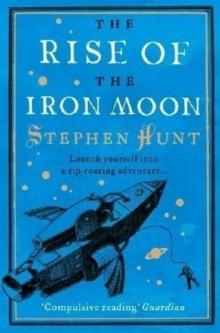 The Rise of the Iron Moon
The Rise of the Iron Moon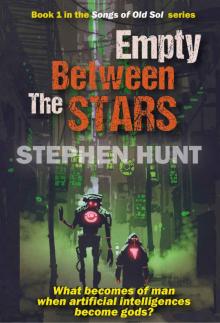 Empty Between the Stars (The Songs of Old Sol Book 1)
Empty Between the Stars (The Songs of Old Sol Book 1)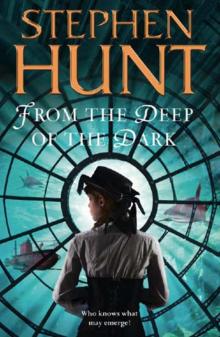 From the Deep of the Dark
From the Deep of the Dark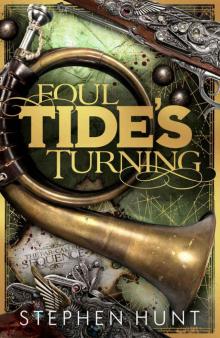 Foul Tide's Turning
Foul Tide's Turning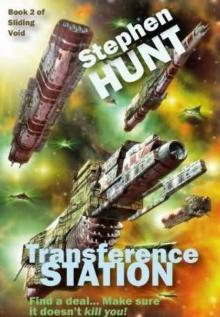 Transference Station
Transference Station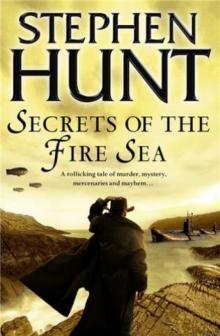 Secrets of the Fire Sea j-4
Secrets of the Fire Sea j-4 Void All The Way Down: The Sliding Void Omnibus
Void All The Way Down: The Sliding Void Omnibus The Kingdom Beyond the Waves j-2
The Kingdom Beyond the Waves j-2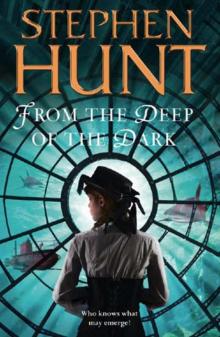 From the Deep of the Dark j-6
From the Deep of the Dark j-6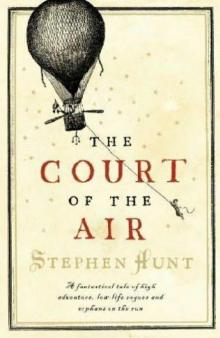 The Court of the Air
The Court of the Air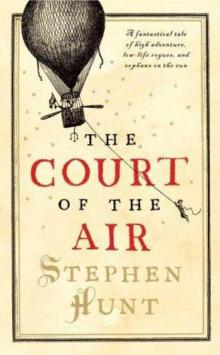 The Court of the Air j-1
The Court of the Air j-1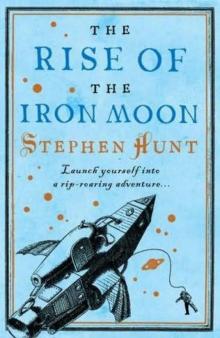 The rise of the Iron Moon j-3
The rise of the Iron Moon j-3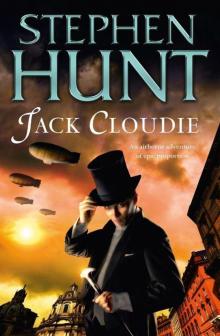 Jack Cloudie j-5
Jack Cloudie j-5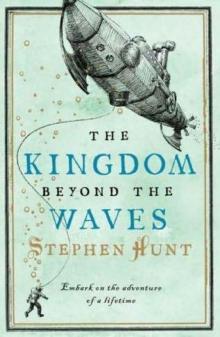 The Kingdom Beyond the Waves
The Kingdom Beyond the Waves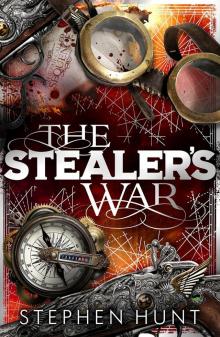 The Stealers' War
The Stealers' War In Dark Service
In Dark Service